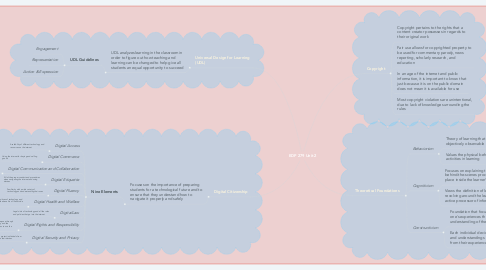
1. Universal Design for Learning (UDL)
1.1. UDL analyzes learning in the classroom in order to figure out how teaching and learning can be changed to help give all students an equal opportunity to succeed
1.1.1. UDL Guidelines
1.1.1.1. Engagement
1.1.1.2. Representation
1.1.1.3. Action & Expression
2. Digital Citizenship
2.1. Focuses on the importance of preparing students for a technological future and to ensure that they understand how to navigate it properly and safely
2.1.1. Nine Elements
2.1.1.1. Digital Access
2.1.1.1.1. Availability of different technology and resources on the internet
2.1.1.2. Digital Commerce
2.1.1.2.1. Using the internet for buying and selling goods
2.1.1.3. Digital Communication and Collaboration
2.1.1.3.1. Exchange of information via technology and the internet
2.1.1.4. Digital Etiquette
2.1.1.4.1. All of the proper conduct and procedures when navigating the internet and using devices
2.1.1.5. Digital Fluency
2.1.1.5.1. Familiarity with a wide variety of technology and understanding their uses
2.1.1.6. Digital Health and Welfare
2.1.1.6.1. Emphasizes positives of technology and acknowledges the benefits of life outside of screen time
2.1.1.7. Digital Law
2.1.1.7.1. Legal side of technology and all the rules and policies that go into the internet
2.1.1.8. Digital Rights and Responsibility
2.1.1.8.1. Refers to the access to everyone through the internet and technology and the responsibilities everyone has to use the platforms appropriately
2.1.1.9. Digital Security and Privacy
2.1.1.9.1. Software that can protect individuals from harmful attacks on their devices
3. Copyright
3.1. Copyright pertains to the rights that a content creator possesses in regards to their original work
3.2. Fair use allows for copyrighted property to be used for commentary parody, news reporting, scholarly research, and education
3.3. In an age of the internet and public information, it is important to know that just because it is on the public domain does not mean it is available for use
3.4. Most copyright violations are unintentional, due to lack of knowledge surrounding the rules
4. Theoretical Foundations
4.1. Behaviorism
4.1.1. Theory of learning that focuses on objectively observable behaviors
4.1.2. Values the physical behaviors over mental activities in learning
4.2. Cognitivism
4.2.1. Focuses on explaining the behind-the-scenes processes that take place inside the learner's brain
4.2.2. Views the definition of learning as revolving around the learner being an active processor of information
4.3. Constructivism
4.3.1. Foundation that focuses on reflecting on one's experiences that shape their understanding of the world
4.3.2. Each individual decides on their own rules and understandings of their surroundings from their experiences
